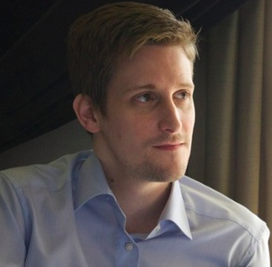
Citizenfour premiered Friday night at the New York Film Festival in New York City.
Here's a review of the film from The Guardian, one of the first papers to reveal the secret NSA global surveillance program based on Snowden's leaks of classified documents:
Citizenfour must have been a maddening documentary to film. Its subject is pervasive global surveillance, an enveloping digital act that spreads without visibility, so its scenes unfold in courtrooms, hearing chambers and hotels. Yet the virtuosity of Laura Poitras, its director and architect, makes its 114 minutes crackle with the nervous energy of revelation.
Poitras, the first journalist contacted by National Security Agency whistleblower Edward Snowden, mirrors her topic. She rarely appears on news programs or chat shows. She is a mysterious character in her own movie, heard more than she is seen.
But surreptitiously, Poitras has been a commander of a stream of disclosures for 16 months that have forced the NSA into a new and infamous era. Citizenfour demonstrates to the public the prowess that those of us who have worked with her on the NSA stories encountered. Her movie, the culmination of a post-9/11 trilogy that spans a dark horizon from Iraq to Guantánamo, is a triumph of journalism and a triumph for journalism.
At its heart, Citizenfour is the story of how Snowden’s disclosures unfolded through Poitras’ eyes, from the first communications Snowden sends Poitras, hinting at what is to come, until Snowden sees himself vindicated through emulation. (The film is named for a pseudonym Snowden used with Poitras.) The time before Poitras meets Snowden is symbolized by a car travelling through a pitch-black tunnel, barely illuminated by the glowing red lights on the ceiling, until sunlight bursts in when she and her colleagues Glenn Greenwald and the Guardian’s Ewen MacAskill arrive in Hong Kong for their fateful encounter.
Citizenfour must have been a maddening documentary to film. Its subject is pervasive global surveillance, an enveloping digital act that spreads without visibility, so its scenes unfold in courtrooms, hearing chambers and hotels. Yet the virtuosity of Laura Poitras, its director and architect, makes its 114 minutes crackle with the nervous energy of revelation.
Poitras, the first journalist contacted by National Security Agency whistleblower Edward Snowden, mirrors her topic. She rarely appears on news programs or chat shows. She is a mysterious character in her own movie, heard more than she is seen.
But surreptitiously, Poitras has been a commander of a stream of disclosures for 16 months that have forced the NSA into a new and infamous era. Citizenfour demonstrates to the public the prowess that those of us who have worked with her on the NSA stories encountered. Her movie, the culmination of a post-9/11 trilogy that spans a dark horizon from Iraq to Guantánamo, is a triumph of journalism and a triumph for journalism.
At its heart, Citizenfour is the story of how Snowden’s disclosures unfolded through Poitras’ eyes, from the first communications Snowden sends Poitras, hinting at what is to come, until Snowden sees himself vindicated through emulation. (The film is named for a pseudonym Snowden used with Poitras.) The time before Poitras meets Snowden is symbolized by a car travelling through a pitch-black tunnel, barely illuminated by the glowing red lights on the ceiling, until sunlight bursts in when she and her colleagues Glenn Greenwald and the Guardian’s Ewen MacAskill arrive in Hong Kong for their fateful encounter.
The film leaves many questions unanswered, such as Wikileaks’ role in Snowden’s drama – Julian Assange is briefly on camera – and Snowden’s circumstances in the authoritarian Russia that has granted him asylum. But Citizenfour shows Snowden vindicated when the film confirms that Greenwald, Poitras and their investigative partner Jeremy Scahill are working with a new security whistleblower, one apparently inspired by Snowden. While understated, Snowden appears thrilled, even moved.
Given the passions that the NSA disclosures have generated, it’s remarkable how tempered Citizenfour comes across. Reflecting a style Poitras seems to share with Snowden, it’s a quiet movie, its soundtrack a sinister digital throb, packed tight with questions about how we live freely in an unseen dragnet. One of its only boisterous moments comes when Snowden and Greenwald discuss the spirit animating both the reporting and Snowden’s decision to reveal himself. Greenwald describes it as “the fearlessness and the fuck-you”.
That fearlessness attracted Snowden to Poitras, and it shows through her camera.
Citizenfour opens in US cinemas on 24 October.
Watch video